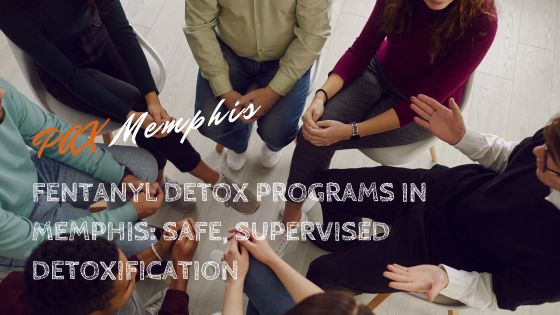Fentanyl is a potent prescription opioid drug intended for use as a pain reliever under careful medical supervision. However, many people abuse this drug–and the consequences can be life-threatening.
People who take fentanyl as a prescription must be aware of the dangers of abuse and addiction, and those using this powerful drug recreationally must seek immediate treatment to stop using it safely.
Fentanyl addiction is a complex condition, and people who misuse fentanyl must receive compassionate, comprehensive treatment. Recovering from fentanyl abuse and addiction often begins in a fentanyl detox program.
This article will explore the basics of fentanyl addiction, what to expect from fentanyl detox programs in Memphis, and how to find the care you need to recover. Reach out to the team at PAX Memphis now to learn about our supportive fentanyl detox programs or any of our comprehensive treatment programs.
Fentanyl Addiction: The Basics
Fentanyl is a potent, synthetic opioid developed for use in a supervised medical setting to relieve pain. It is derived from the opium poppy plant and is chemically similar to morphine. However, fentanyl is much stronger than morphine–about 50 to 100 times more potent.
Because it is so potent, fentanyl is lethal in tiny doses. People who use fentanyl have a significant risk of a deadly overdose. People may also unintentionally ingest fentanyl while using other drugs, especially other opioids.
Fentanyl reaches the brain quickly after someone ingests it. It binds to opioid receptors throughout the brain in areas related to emotions, pleasure, and reward. It also causes the brain to release endorphins, one of its primary “feel good” chemicals.
Endorphins provide natural pain relief and pleasure. People who use fentanyl may experience a rush of intense happiness, well-being, and warmth known as euphoria. This pleasurable feeling can cause people to want to use more fentanyl than prescribed or to use it recreationally.
The Effects and Risks of Fentanyl Abuse
Fentanyl works well as a pain reliever, helping people to manage moderate to severe pain after surgery, treatment of medical conditions, or chronic pain. People who take fentanyl may experience unwanted effects, including:
- Drowsiness
- Sedation
- Loss of consciousness
- Nausea
- Constipation
- Confusion
- Depressed (slow, shallow) breathing
The most significant risk of fentanyl use is overdose. Fentanyl is so potent that a tiny amount can cause a fatal overdose. People who use fentanyl as prescribed must use it exactly as their doctor told them to, and people who use it recreationally must seek professional help to stop.
People who use other illicit drugs must also be aware of the risk of unintentional fentanyl exposure and overdose. Drug dealers may add fentanyl to other drugs, putting people at risk of accidental fentanyl ingestion and overdose.
Signs of a fentanyl overdose include:
- Constricted (small) pupils
- Cold, clammy skin
- Pale or bluish skin
- Blue fingernails and lips
- Very slow or shallow breathing, or no breathing at all
- Loss of consciousness
- Limp limbs
- Slurred speech
- Choking or gurgling sounds
- Unresponsiveness
- Vomiting
A fentanyl overdose is a life-threatening medical emergency. If someone near you is experiencing a fentanyl overdose, call 911 immediately. If you have naloxone available, administer it as soon as possible. Wait with the person until EMS arrives.
The only way to prevent a fentanyl overdose is to stop taking it and to quit using other illicit drugs–especially opioids. If you or someone you love lives with opioid or fentanyl abuse, seek treatment as soon as possible.
Understanding Fentanyl Withdrawal
People who use fentanyl regularly may develop a physical dependence on it. If they abruptly stop taking this potent drug, they’re likely to experience a range of uncomfortable withdrawal symptoms, including:
- Muscle and bone pain
- Severe stomach cramps
- High blood pressure
- Excessive yawning
- Chills
- Goosebumps
- Leg twitching
- Runny nose
- Teary eyes
- Fever
- Anxiety
- Diarrhea
- Nausea and vomiting
- Intense cravings
Fentanyl withdrawal symptoms can be so intense and uncomfortable that many people relapse before their bodies can detoxify. Relapsing during fentanyl detox is more likely to lead to an overdose because people’s tolerance is lower after even a short period of abstinence.
What to Expect From Fentanyl Detox Programs in Memphis
Fentanyl detox programs in Memphis provide safe, supervised detoxification services in a secure setting. People with fentanyl abuse and addiction require significant medical treatment during detox to remain safe and reduce the risk of life-threatening complications.
During fentanyl detox programs, people receive the supervision, care, and treatment they need to manage withdrawal symptoms and avoid relapse. Detox treatment plans typically include:
- Medications like methadone or buprenorphine to reduce cravings, manage withdrawal symptoms, and reduce the risk of complications during detoxification
- Emotional support, including individual and group therapy when appropriate
- 24/7 supervision
- Regular screenings and medical monitoring
- Gradual tapering of opioids to maintain safety and reduce the severity of withdrawal symptoms
The care people receive during fentanyl detox programs can help them safely detox from fentanyl and other substances. This gives them a solid foundation to build upon during treatment and aftercare and helps to support lifelong sobriety.
Find Fentanyl Detox Programs in Memphis
If you or someone you love struggles with fentanyl addiction, the care you need is available at PAX Memphis. Reach out to our team of specialists now to learn about our safe, supportive fentanyl detox programs or any of our comprehensive fentanyl addiction treatment programs in Memphis.
Medically Reviewed: September 25, 2019

All of the information on this page has been reviewed and verified by a certified addiction professional.










